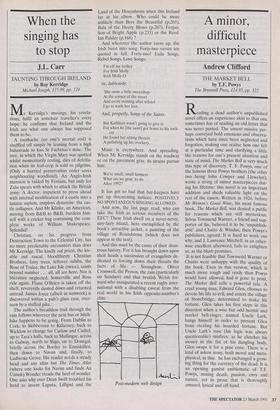When the singing has to stop
J.L. Carr
JAUNTING THROUGH IRELAND by Roy Kerridge Michael Joseph, £15.99, pp. 324 Mr Kerridge's musings, his revela- tions, fulfil an armchair traveller's every hope: he confirms that Ireland and the Irish are what one always has supposed them to be.
A toothache (or one's mortal coil) is shuffled off simply by leaning from a high balustrade to kiss St Fachtnas's nose. The tree, in which the Virgin Mary was spotted whilst momentarily resting, dies of defolia- tion when its leaf-crop is sold to pilgrims. (Only a hurried preservation order saves neighbouring woodland). An Anglo-Irish mansion is raided by Fenians, but only for Zulu spears with which to attack the British army. A doctor, impatient to press ahead with internal modification of a castle into a lunatic asylum, employs dynamite: the cas- tle collapses. And Mr Klinke, an American, moving from B&B to B&B, burdens him- self with a cricket bag containing the com- plete works of William Shakespeare. Splendid! Christian, on his progress from Destruction Town to the Celestial City, has no more predictable encounters than does Mr Kerridge. The kindly oul priest, the lov- able oul rascal, bloodthirsty Christian Brothers, fairy trees, leftover sahibs, the Rose of Tralee, the Lake Isle (twice), saints beyond number. . . all, all are here. Nor is literature neglected. Somerville and Ross ride again. Flann O'Brien is taken off the shelf, reverently dusted down and returned unread. James Joyce (albeit in waxwork) is discovered within a pub's glass case, over- seen by a stuffed pike.
The author's breathless trail through the rain follows wherever the next bus or hitch- hike happens to be going. From Dublin to Cork, to Skibbereen to Killarney, back to Wicklow to change for Carlow and Cashel, up to Tara's halls, back to Mullingar, across to Galway, north to Sligo, on to Donegal, briefly across the Border to Enniskillen, then down to Navan and, finally, to Ladbroke Grove. His reader needs a steady head and any atlas but The Times Atlas (where one looks for Navan and finds An Uaimh).Wonder treads the heel of wonder. One asks why ever Dean Swift troubled his head to invent Laputa, Lilliput and the
Land of the Houynhnms when this Ireland lay at his elbow. Who could be more unlikely than Bres the Beautiful (p.265), Bala of the Heavy Blows (p.267), Fergus, Son of Bright Apple (p.233) or the Revd. Ian Paisley (p.168) ?
And wherever the author turns up, the Irish burst into song. Forty-two verses are quoted in full. Forty-two! Exile Songs, Rebel Songs, Love Songs:
I'm off my trolley For Irish Molly Irish Molly-0
or, dubiously:
She owns a little sweetshop At the corner of the street And every evening after school I go to wash her feet.
And, properly, Songs of the Saints:
But Kathleen wasn't going to give in For when he [the saint] got home to his rock- ery He found her sitting therein A-polishing up his crockery...
Music is everywhere. And spreading. When Mr Kerridge stands on the roadway or on the pavement gray, its strains pursue him:
We're small, small farmers What are we goin' to do After 1992?
It has got so bad that bar-keepers have put up threatening notices: POSITIVELY NO SPONTANEOUS SINGING ALLOWED.
And now, the last page read, who can take the Irish as serious members of the EEC? These Irish dwell on a never-never, airy-fairy island, here exemplified by the book's attractive jacket, a painting of the village of Roundstone (which does not appear in the text).
And this must be the cause of their disas- trous history. For it has brought down upon their heads a succession of evangelists de- dicated to forcing down their throats the facts of life — Strongbow, Oliver Cromwell, the Provos, the rain (particularly on Sundays) and that brutish Welsh for- ward who inaugurated a recent rugby inter- national with a disabling caveat from the real world to his Irish opposite-number's chin.
Post-modern web design


























































 Previous page
Previous page